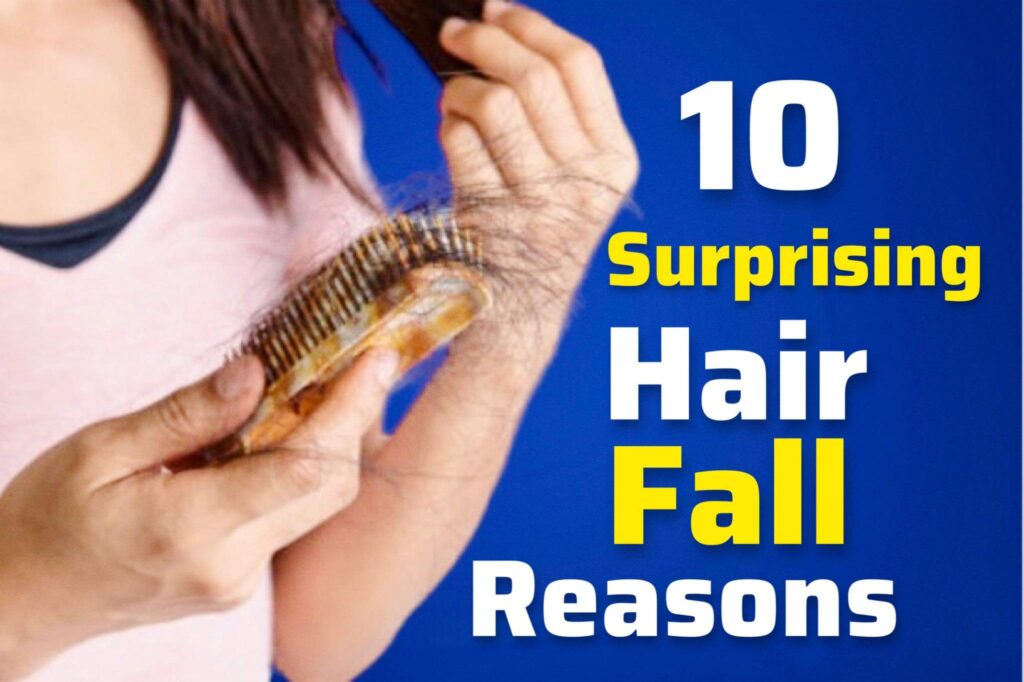
Introduction
Nowadays, hair fall is one of the most common problems that hinders the beauty of many people so it is very important to know the reasons behind our hair loss. Today we will try to highlight ten surprising causes of hair loss that will help you to stop your hair loss. So, read till the end.
Hereditary Factors: The Genetic Influence on Hair Fall
- Hair Fall patterns are significantly influenced by genetics.
- People who have hair fall in their families are more prone to develop it themselves.
- Hair Fall may be influenced by hereditary Diseases like Androgenetic Alopecia.
Hormonal Imbalances: Unraveling the Underlying Causes
- Hormonal imbalances can Disrupt the hair growth cycle and result in hair fall.
- Conditions like polycystic ovary syndrome PCOS and thyroid disorders contribute to hormonal hair fall.
- Pregnancy and menopause are events that can trigger hair fall due to hormonal shifts.
Nutritional Deficiencies: A Link You Didn’t Expect
- The upkeep of healthy hair is greatly influenced by Essential Elements like vitamins, minerals and proteins.
- Deficiencies in certain vitamins and minerals, such as vitamin D or iron can lead to hair fall.
- Poor diet and malnutrition are often linked to increased hair fall.
Stress and Anxiety: The Silent Culprits
- Ongoing stress might interfere with the hair cycle and cause hair fall.
- Managing stress through techniques like Meditation and Exercise can promote Hair wellness.
Environmental Factors: The External Triggers
- Pollution UV rays and hard water can damage the hair and lead to Hair Fall.
- Climate such as extreme heat or cold can affect the overall health of the hair.
- To stop hair loss the hair must be protected from environmental harm.
Over styling and Chemical Treatments: The Hidden Dangers
- Excessive use of heat styling tools such as Curling irons and straighteners can weaken the Hair and lead to breakage.
- Chemical treatments like perming and coloring can damage the hair shaft and result in Hair Fall.
- Maintaining healthy hair requires adopting safer style techniques and reducing the usage of damaging products.
Medication and Medical Conditions: Unexpected Side Effects
- Certain medications such as those used for cancer or high blood pressure can cause hair fall as a side effect.
- Medical conditions like Alopecia Areata or scalp infections can also contribute to hair fall.
- For the health of your hair generally, you should take precautions to reduce hair loss while receiving therapy.
Aging and Hair Fall: The Natural Process
- Hair fall is a natural part of the aging process.
- The structure and growth of hair change as we age resulting in gradual hair fall.
- Embracing and caring for aging hair can help maintain it is health and appearance.
Autoimmune Disorders: The Unseen Intruders
- Autoimmune diseases such as lupus or psoriasis can lead to hair fall.
- Alopecia, an autoimmune condition specifically targets the hair follicles causing hair fall.
- Managing hair fall due to autoimmune conditions often requires a comprehensive treatment approach.
Hair Care Practices: Unveiling the Hidden Mistakes
- Misconceptions regarding hair care that are widely held can cause hair loss.\
- Detrimental practices such as excessive brushing or towel-drying can weaken the hair strands.
- Following a healthy hair care routine including proper shampooing and conditioning techniques is vital for preventing hair fall.
Hair Care Products: Reading Between the Labels
- Hair care products often contain harmful ingredients that can contribute to Hair fall.
- Choosing products free from sulfates, parabens, and silicones can help minimize hair damage.
- Hair health can be promoted with the use of natural alternatives and DIY therapies.
Hair Fall Myths: Busted!
- Debunking common misconceptions about hair fall can provide clarity.
- For making wise decisions, it is crucial to shed light on the facts underlying widely held beliefs.
- Ensuring knowledge about hair fall empowers individuals to take appropriate action
Hair Fall Treatments: Exploring the Available Options
- Various treatments, including medications supplements, and topical solutions, can help address hair fall.
- Noninvasive treatments that encourage hair growth include scalp massages and Laser therapy.
- Professional hair loss treatments, Such as hair transplants offer successful outcomes for Severe cases of Hair fall.
Prevention is Better Than Cure: Tips to Maintain Healthy Tresses
- Implementing lifestyle changes, Such as a balanced diet and Regular exercise can prevent hair fall.
- Nurturing proper Hair hygiene and care Habits including Regular trims and Gentle handling are crucial for preserving Hair Health.
- Taking a holistic approach, including Stress management and regular Scalp massages can Contribute to strong and luscious hair.
Summary: Understanding the Complexities of Hair Fall
- Recap of the ten surprising reasons behind hair fall.
- Emphasizing the Significance of a Comprehensive approach to combat Hair fall.
- encouraging readers to take action and look for suitable solutions.
Conclusion
- It is essential to comprehend the root causes of hair fall once more.
- Encouraging readers to seek professional advice when Experiencing hair fall.
- Empowering readers with the knowledge to effectively combat hair fall and maintain healthy tresses.
FAQs: Addressing Common Queries about Hair Fall
Why does hair fall vary between individuals?
Hair fall can vary between individuals due to a combination of genetic, environmental, and lifestyle factors.
Can excessive hair fall be reversed naturally?
While excessive hair fall can often be reversed naturally through healthy habits severe cases may require professional intervention.
Are there any side effects of hair loss treatments?
Hair loss treatments may have potential side effects but consulting with a healthcare professional can help minimize risks.